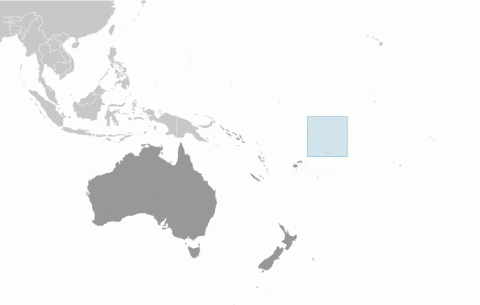Child Labor and Forced Labor Reports
Tokelau


No Advancement
Although research found no evidence that child labor exists in Tokelau, in 2024, the government made no advancement in efforts to prevent the worst forms of child labor. The government has not established adequate legal protections to prevent the worst forms of child labor. For instance, the law does not criminally prohibit the use, procuring, or offering of a child for prostitution, the production of pornography, or pornographic performances; or the use of children for illicit activities, including for the production and trafficking of drugs. In addition, Tokelau has not established a minimum age for work and lacks a law that prohibits hazardous occupations and activities for children.
Research found no evidence that child labor exists on Tokelau.
Barriers to Education Access
Although education in Tokelau is free for citizens, the territory is isolated, and unreliable access to transportation and telecommunication services limit students’ access to education. Additionally, children without birth certificates and those without permanent resident status are not afforded free public education by law, though there is no evidence this happens in practice.
| Standard | Age | Meets International Standards | Legislation |
|---|---|---|---|
| Minimum Age for Work | ✗ | ||
| Minimum Age for Hazardous Work | ✗ | ||
| Identification of Hazardous Occupations or Activities Prohibited for Children | ✗ | ||
| Prohibition of Slavery, Debt Bondage, and Forced Labor | ✗ | ||
| Prohibition of Child Trafficking | ✗ | ||
| Prohibition of Commercial Sexual Exploitation of Children | ✗ | ||
| Prohibition of Using Children in Illicit Activities | ✗ | ||
| Minimum Age for Voluntary State Military Recruitment | 17 | ✓ | Article 33 of the Government of New Zealand’s Defense Act |
| Prohibition of Compulsory Recruitment of Children by (State) Military | N/A | ||
| Prohibition of Military Recruitment by Non-state Armed Groups | ✗ | ||
| Compulsory Education Age | 16 | ✓ | Article 63(1) of the Tokelau Crimes, Procedures, and Evidence Rules Act |
| Free Public Education | ✗ | Part 1, Section 3 of the Government of New Zealand’s Education Act |
Tokelau has not established legislation on the minimum age for work, nor has the government determined the minimum age for hazardous work or the types of work that are hazardous for children. The government also does not prohibit slavery or slavery-like practices such as forced labor. Tokelau’s trafficking provision does not clearly criminalize domestic trafficking or the trafficking of children in the absence of force, fraud, or coercion. In addition, the government does not criminalize the use, procuring, or offering of children for prostitution, pornography, or pornographic performances. Tokelau has also not criminalized the use of children in illicit activities, including in the production and trafficking of drugs. Although there are no armed forces in Tokelau, the law does not criminally prohibit non-state armed groups from recruiting children under age 18. Finally, undocumented children and those without permanent resident status are not afforded free public education by law, though there is no evidence this happens in practice.
| Organization/Agency | Role & Activities |
|---|
| Tokelau Police: Enforce laws related to child labor. |
As there is no evidence of a child labor problem, there appears to be no need for policies, programs, or a mechanism to coordinate efforts to address child labor.
| Area | Suggested Action |
|---|---|
| Legal Framework | Ratify ILO Convention 182, the convention concerning the prohibition of and immediate action on the elimination of the worst forms of child labor. |
| Ratify the UN Convention on the Rights of the Child. | |
| Ratify the UN Convention on the Rights of the Child Optional Protocol on Armed Conflict. | |
| Ratify the UN Convention on the Rights of the Child Optional Protocol on the Sale of Children, Child Prostitution, and Child Pornography. | |
| Ratify the Palermo Protocol on Trafficking in Persons. | |
| Establish a minimum age for work of at least age 16 that equals the compulsory age of education, establish age 18 as the minimum age for hazardous work, and identify hazardous occupations and activities prohibited for children. | |
| Ensure that laws criminally prohibit forced labor, including debt bondage and slavery. | |
| Ensure that laws prohibit the trafficking of children domestically and internationally for commercial sexual exploitation and forced labor, and do not require the use of force to be established for the crime of trafficking. | |
| Ensure that laws criminally prohibit the use, procuring, and offering of a child for prostitution, the production of pornography, and pornographic performances. | |
| Ensure that laws criminally prohibit the use of children for illicit activities, including for the production and trafficking of drugs. | |
| Ensure that the law criminally prohibits the forced or compulsory recruitment of children under age 18 into non-state armed groups. | |
| Ensure that free public education is afforded to all children, regardless of citizenship, legal, or resident status. |
